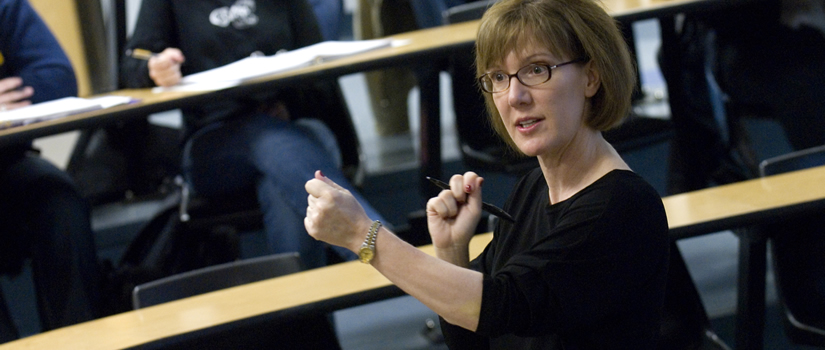Program Goals
- Better prepare participants for all aspects of their faculty careers including teaching, scholarly research, and service.
- Provide a mechanism for recognition of initiative and gained experience in the areas of faculty roles and teaching.
- Provide participants with credentialing for a diverse and competitive academic job market.
- Encourage development of a positive, sustained mentoring relationship with a faculty member, allowing for a more in-depth look at a successful faculty career.
- Provide a context to encourage reflective critical thinking to assess personal growth in teaching, professional development skills, and perspectives on the academic community.
- Provide and promote professional development opportunities and resources related to teaching and learning.
Program Application, Requirements, and Resources
Graduate students and post-docs interested in the PFF Program must submit an application and statement of interest, preferably early in their degree program or tenure here at USC. Signature of the student's advisor or P.I. is required. A PFF credential is awarded upon completion of significant PFF-related experiences as detailed in the Requirements below. Only activities that occur while the participant is here at USC will count towards the PFF program. Credentials are presented at Graduate Student Day during the spring semester.
- PFF participants choose activities in each of the three areas of faculty responsibilities: teaching, scholarship/research, and service. The Activity Checklist provides a list of common activities which can be used to fulfill PFF requirements.
- Participants must complete at least one activity from each of the seven subcategories.
- Participants may propose "Other" activities to the PFF Program Manager to count in any given subcategory; approval is at the discretion of the PFF Program Manager.
- Items with an asterisk (*) require a Faculty Mentor Reflection (see Faculty Mentoring section below).
- Each activity has a point value; participants must earn a minimum of 15 points (point limitations in each subcategory are noted in the Activity Checklist).
- Points are awarded upon satisfactory completion of an Activity Reflection Form (see below).
- Activities completed prior to applying for PFF will qualify, but only activities completed during a student's time here at USC qualify.
- For any activity to count toward the PFF credential, a PFF participant must complete an Activity Reflection Form and submit it to the PFF Program Manager for review. Reflections are an opportunity to think about and reflect on the importance and professional development impact of each experience. Guidelines for writing reflections are provided below; the space provided in the Reflection Form should not be considered a limit to reflection length.
- Reflections may be submitted one at a time or all together, in hard copy or electronically, to the PFF Program Manager.
Activity Reflection Form (pdf)
Activity Reflection Form (doc)
An essential element of the PFF program is providing mentoring opportunities for PFF participants and faculty. PFF participants must participate in at least one mentored teaching experience and may participate in other scholarly activities that include mentor involvement as well. PFF applicants should enlist support of a discipline-specific faculty mentor who can commit to completing the mentored activity with the PFF participant. These faculty will complete a Faculty Mentor Reflection Form in order to document the mentoring experience. Faculty mentors are typically the instructor of record for teaching-related activities or the major advisor for scholarly and research activities.
Faculty Mentor Reflection Form [pdf]
Faculty Mentor Reflection Form [doc]
Application Form [pdf]
Application Form [doc]
Activity Reflection Form (pdf)
Activity Reflection Form (doc)
Guidance on Writing Reflections (pdf)
Faculty Mentor Reflection Form [pdf]
Faculty Mentor Reflection Form [doc]
CTE Reading Library
The Reading Library housed in the Center for Teaching Excellence includes the following PFF-specific manuals:
- Devine, K. (2001). Developing Intellectual Entrepreneurship: For grad students, communication is a basis for success. The Scientist. March 5, 2001.
- Gaff, J.G., Pruitt-Logan, A.S., Sims, L.B., & Denecke, D.D. (2003). Preparing Future Faculty in the Humanities and Social Sciences: A Guide for Change. Council of Graduate Schools and the Association of American Colleges and Universities: Washington, DC.
- Pruitt-Logan, A.S., Gaff, J.G. , & Jentoft, J.E. (2002). Preparing Future Faculty in the Sciences and Mathematics: A Guide for Change. Council of Graduate Schools and the Association of American Colleges and Universities: Washington, DC.
Online Resources
- Council of Graduate Schools website.
- Denecke, D.D., Kent, J., and Wiener, W. (2011). Preparing Future Faculty to Assess Student Learning: A report on a CGS project supported by a grant from the Teagle Foundation. Council of Graduate Schools, Washington D.C.
- Understanding PhD Career Pathways for Program Improvement Council of Graduate Schools, Washington D.C.
- Adams, K.A. (2002). "What Colleges and Universities Want in New Faculty." Preparing Future Faculty Occasional Paper Series. Association of American Colleges and Universities: Washington, DC. (Available courtesy of AAC&U.)
- A long list, some with clickable links, of occasional papers, articles, and books about PFF programs and outcomes nationwide is available at the Preparing Future Faculty website.
How to incorporate and document your credential:
On your Résumé or Curriculum Vitae:
- List as "Preparing Future Faculty Credential" or "Preparing Future Faculty Certificate"
- Place this in a section such as "Professional Development Activities," "Other Professional Activities," or "Training and Certifications."
In a cover letter or job application form:
Feel free to use or modify this formal statement: "Successful PFF candidates have completed activities designed to prepare participants in the critical areas of faculty competence: teaching, research and service. This accomplishment is an indicator of the participant's initiative and a measure of experience toward becoming future faculty."
